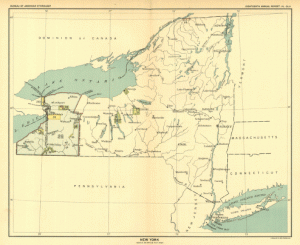Many students are getting advice that they ought to major in something useful, or practical, and that history and the other liberal arts are luxuries that really add little of value. Fortunately, the historical profession has begun to push back against this sort of nonsense, as in this nice essay by Jacob Anbinder.
Monthly Archives: October 2016
Red Lives Matter
NPR’s Story Corps project aired this morning the story of woodcarver John T. Williams, gunned down by a Seattle police officer in 2010. Williams was carrying his carving knife as he crossed a street. Deaf in one ear, he did not respond to the officer’s command to drop his knife, and the officer opened fire in a matter of seconds. As in so many recent stories of police shootings of people of color, no charges were filed against the officer. You can listen to the story told by Rick Williams, John T. Williams’s brother, by following this link.
The Presidential Debates and Native American Rights
Neither Governor Pence nor Senator Kaine had anything to say about the rights of native people, the Dakota Access Pipeline, and the challenges faced by Native communities, and that is unlikely to change in either of the two remaining scheduled presidential debates. It is worthwhile, then, to read the party platforms and compare the Republicans’ proposals resting upon commercial development in Indian Country and the elimination of federal “red tape” that makes this development difficult (see pages 36 and 37 of the Party’s platform) and the Democrats much fuller menu of proposals:
We will restore tribal lands by continuing to streamline the land-into-trust process and recognize the right of all tribes to protect their lands, air, and waters.
We will continue to work on a government-to-government basis to address chronic underfunding, and provide meaningful resources and financial investments that will empower American Indian tribes through increased economic development and infrastructure improvements on tribal lands.
We will strengthen the operation of tribal housing programs, and reauthorize the Indian Housing Block Grant Program. We will increase affordable and safe housing and fight to significantly reduce homelessness on and off Indian reservations, especially among Native youth and veterans.
We will invest in Indian education from early childhood through higher education. We will fully fund the Bureau of Indian Education (BIE), strengthen self-determination to enable culturally-tailored learning unique to each tribal nation, and help to recruit and retain qualified teachers for Native learners. Democrats will continue to support President Obama’s Generation Indigenous initiative that has made important strides in promoting new investments and increased engagement with American Indian youth, including by continuing efforts to reform the BIE to provide students attending BIE-funded schools with a world-class culturally-based education. We also support the elimination of school and sports mascots that reflect derogatory stereotypes and that perpetuate racism.
We will strengthen tribal sovereignty and tribal jurisdiction by enacting laws and policies that enhance the ability of Indian nations to govern their territories, keep their communities safe, and prosecute crimes committed on tribal lands.
We will build on the important provisions in the Violence Against Women Reauthorization Act of 2013, which reaffirmed the right of Indian tribes to prosecute perpetrators regardless of race who commit domestic violence on tribal lands. Democrats will continue to work to address criminal justice gaps that undermine the safety of tribal communities. And we will back these efforts through robust investments in effective tribal law enforcement and tribal courts.
We believe that health care is a core federal trust responsibility, and we support a robust expansion of the health care provided by the Indian Health Service. We will work to fully fund the Indian Health Service, Tribal, and Urban Indian health care system and to ensure that all American Indians have adequate, safe, and affordable access to primary care providers, including oral health, mental health practitioners, and substance abuse treatment options.
We acknowledge the past injustices and the misguided, harmful federal and state policies and actions based on outdated and discredited values and beliefs that resulted in the destruction of the Indian nations’ economies, social, and religious systems, the taking of their lands, and the creation of intergenerational trauma that exists to this day. We believe that we have a moral and profound duty to honor, respect, and uphold our sacred obligation to the Indian nations and Indian peoples.
We will manage for tribal sacred places, and empower tribes to maintain and pass on traditional religious beliefs, languages, and social practices without fear of discrimination or suppression.
We also believe that Native children are the future of tribal nations and that the Indian Child Welfare Act is critical to the survival of Indian culture, government, and communities and must be enforced with the statutory intent of the law.
We will strengthen Indian voting rights, including improved access to polling locations. We will build on federal programs to reduce the disproportionate incarceration of American Indian and Alaska Native men and women, reduce disparities in prison sentencing, protect the religious rights of Native prisoners, reduce barriers to prisoner reentry, and offer access to housing and employment upon reentry.
We are committed to principles of environmental justice in Indian Country and we recognize that nature in all its life forms has the right to exist, persist, maintain, and regenerate its vital cycles. We call for a climate change policy that protects tribal resources, protects tribal health, and provides accountability through accessible, culturally appropriate participation and strong enforcement. Our climate change policy will cut carbon emission, address poverty, invest in disadvantaged communities, and improve both air quality and public health.
We support the tribal nations efforts to develop wind, solar, and other clean energy jobs. We will engage in meaningful and productive consultation with Tribal Leaders, and will host a White House Tribal Nations Conference annually bringing together cabinet and senior level federal officials to gather input from Tribal Nations when formulating federal policy impacting tribes. Democrats believe that American Indian/Alaska Natives shall be represented in the federal government to properly reflect their needs and will work to appoint American Indian/Alaska Natives to key positions, including retaining a senior level policy position in the White House Domestic Policy Council.
We will strengthen the White House Council on Native American Affairs. Democrats will increase engagement with American Indians/Alaska Natives living outside of tribal communities. Democrats also support efforts for self-governance and self-determination of Native Hawaiians. Native Hawaiians are the indigenous, aboriginal people of Hawai’i whose values and culture are the foundation of the Hawaiian Islands. We support proactive actions by the federal government to enhance Native Hawaiian culture, health, language, and education. We recognize and honor the contributions and sacrifices made in service to our country by Native Hawaiians.”
The differences are significant and telling.
Conference Announced
Richard Hakluyt the Younger compiled the sources that allow historians to understand the encounter in the sixteenth century between English explorers, mariners, and traders, and a host of native peoples across several continents. Oxford University will host a conference sponsored by the Hakluyt Society in November commemorating the 400th anniversary of Hakluyt’s death. I will be presenting, as will Joyce 
Lorimer, Carla Rahn Phillips, and many others.
Andrew Jackson’s Removal from the Twenty-Dollar Bill

The Treasury Department recently announced its decision to remove Andrew Jackson from the front of the twenty-dollar bill, a decision justified by Jackson’s slaveholding and the large role he played in the odious policy known as “Indian Removal.”
Jackson certainly bears responsibility for the removal of tens of thousands of Native American people from their homes in the eastern United States to new homes in the west. He signed the Indian Removal Bill into law in 1830, presented Indians with the Hobson’s choice of either leaving or subjecting themselves to hostile state legal systems, and ignored an important Supreme Court decision that protected Indian rights against state aggression. Men he appointed negotiated removal treaties with eastern Indians. Thousands of Native American men and women died.
But Indian removal was popular in many parts of the union. Blaming Jackson for the policy might be emotionally satisfying, but it oversimplifies a complex past. Millions of white Americans supported Indian removal and benefited economically from it. Many still do. Indeed, New York became the “Empire State” on lands wrested from the state’s native population. Millions were guilty, even if Jackson was guiltier than most.
Removals began during the colonial period, a product of disease, enslavement, warfare and dispossession. It continued during the Revolution as the American patriots found it easier to burn Indian towns than to engage native forces in the field. Thomas Jefferson in 1803 thought the possibility of removing the Indians a justification for acquiring Louisiana from the French. Cherokees began moving to Arkansas in 1808; Oneidas from central New York left for Wisconsin in the early 1820s, hoping in part to avoid encroachments on their lands that state and federal authorities lacked the interest or the ability to stop.
Removals, then, began long before Andrew Jackson became President. They continued after he left office. The Cherokee “Trail of Tears” took place in 1838 under Jackson’s successor Martin Van Buren. That same year, Iroquois in New York were coerced and defrauded into signing the most corrupt Indian treaty in all of American history at Buffalo Creek.
In a couple of years, Andrew Jackson will be gone, “removed” to the back of the twenty-dollar bill. Good riddance. He was a violent and angry man, whose harsh embrace of majority rule whatever the consequences ran roughshod over the rights of minorities and heightened sectional tensions. Though his was a consequential and importance presidency, he was a man who thought dueling a reasonable way to resolve conflicts, and his economic policies provoked a significant financial crisis. He attempted to silence the abolitionists, and he embraced and endorsed Indian Removal. But that heinous policy was bigger than one man, and we should not think for a second that demoting him does much at all to expiate the sins of a very guilty nation.
